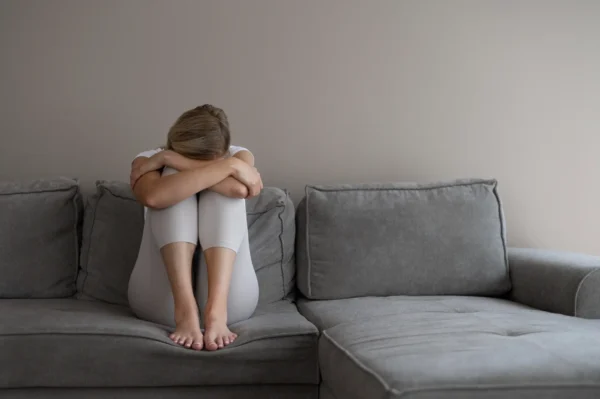- What is Depression?
- Signs of Depression
- How to Help an Adult Child with Depression
- Setting Boundaries and Encouraging Independence
- Dealing with Crisis Situations
- 3 Treatment Options for Depression
- Finding the Right Support
- Developing a Treatment Plan
- 4 Additional Tips for Supporting Your Child
- 1. Encourage Healthy Habits
- 2. Be Patient and Persistent
- 3. Create a Supportive Environment at Home
- Fostering Open Communication
- Building a Routine
- Reducing Stressors
- 4. Supporting Social Connections
- Encouraging Social Interaction
- Joining Support Groups
- Understanding Depression in Different Contexts
- How to Tell if Your Child is Introverted or Depressed
- What Does Depress Brake Mean?
- Postpartum Depression After a Miscarriage
- Long-term Support Strategies
- Maintaining Ongoing Communication
- Adjusting Support as Needed
- Encouraging Self-Advocacy
- Common Questions about Depression
- 911 Detox Center and Our Depression Treatment Services
- Final Thoughts
Understanding and supporting an adult child suffering from depression can be challenging and emotionally draining. However, your support is crucial to their recovery and well-being. This blog will guide you through how to effectively support your adult child through their struggle with depression. We’ll discuss signs of depression, ways to support them, and the importance of professional help.
What is Depression?
Depression is a complex mental health disorder that affects millions of people worldwide, including many young adults. Watching your child struggle can be an incredibly painful experience for any parent. But there are ways you can help. Whether your child is dealing with major depression, postpartum depression after a miscarriage, or any other form of this condition, your support can make a significant difference.
Understanding the intricacies of depression, its symptoms, and how to offer support are crucial steps in helping an adult child cope with this mental health condition. This comprehensive guide will provide you with detailed insights and practical advice to navigate this challenging journey with your child.
Signs of Depression
Recognizing the signs of depression is the first step in helping your adult child. Symptoms can vary but may include:
- Persistent sadness
- Loss of interest in activities once enjoyed
- Changes in appetite
- Trouble sleeping
- Fatigue
- Feelings of worthlessness
For some, it might be tricky to distinguish between introversion and depression. Here’s how to tell if your child is introverted or depressed: introverts recharge by spending time alone, while those with depression tend to isolate themselves due to a lack of energy and interest.
Additional symptoms may include trouble focusing, difficulty making decisions, and thoughts of self-harm or suicide. Recognizing these signs and seeking immediate professional help is critical.
How to Help an Adult Child with Depression
Support begins with open communication:
- Let your child know that you are there for them, without judgment.
- Listen more than you speak, and avoid offering unsolicited advice.
- Encourage them to share their emotions openly and affirm their experiences as valid and meaningful.
Providing a secure, judgment-free environment where your child feels safe discussing their emotions is essential. Let them know that it’s okay to feel the way they do and that you are there to support them through their journey.
Setting Boundaries and Encouraging Independence
- Set healthy boundaries to avoid enabling their depression.
- Encourage them to engage in activities they enjoy, even if they don’t feel like it.
Promoting independence helps your child regain a sense of control and self-efficacy. Encourage them to make small decisions and take responsibility for their well-being, while providing the support and guidance they need.
Dealing with Crisis Situations
- Can I go to urgent care for anxiety and depression? Yes, urgent care centers can provide immediate assistance, but for ongoing support, specialized mental health services are essential.
It’s important to recognize when your child is in crisis and needs urgent help. This might include situations where they express suicidal thoughts or engage in self-harming behaviors. In these cases, seek immediate medical attention and ensure your child is safe.
3 Treatment Options for Depression
Professional treatment is vital in managing depression. Whether your child needs therapy, medication, or a combination of both, it’s important to seek help from qualified professionals.
Depression treatment can include various approaches:
- Cognitive-behavioral therapy (CBT): Focuses on recognizing and transforming unhelpful thought patterns into positive ones.
- Medication management: May involve antidepressants to help balance brain chemicals.
- Interpersonal therapy (IPT): Aims to strengthen communication and enhance personal relationships.
Finding the Right Support
When seeking professional help, consider:
- The therapist’s experience with depression.
- Their treatment approach.
- The availability of support groups.
Finding the right fit for your child can make a significant difference in their recovery journey.
Developing a Treatment Plan
A well-structured treatment plan is crucial. This includes clear treatment plan goals and objectives for depression, tailored to your child’s specific needs. Regular therapy sessions, medication management, and lifestyle changes are often part of an effective plan.
4 Additional Tips for Supporting Your Child
1. Encourage Healthy Habits
Promote a healthy lifestyle by encouraging:
- Regular exercise.
- A balanced diet.
- Adequate sleep.
Physical activity triggers the release of endorphins, which naturally uplift mood and alleviate stress. A nutrient-rich diet filled with fresh fruits, vegetables, and whole grains can play a key role in maintaining and supporting brain health. Ensuring your child gets enough sleep helps regulate mood and cognitive function.
2. Be Patient and Persistent
Recovery from depression is not a linear process. There will be ups and downs, and it’s important to remain patient and persistent. Celebrate small victories and encourage your child to keep going, even when progress feels slow.
3. Create a Supportive Environment at Home
Fostering Open Communication
Keeping an open and honest dialogue with your child is crucial to supporting them effectively. Encourage open conversations where they can express their feelings freely without fear of being judged. Regular check-ins can help you stay connected and provide ongoing support.
Building a Routine
Establishing a daily routine can provide structure and stability for your child. A consistent routine that includes time for therapy, self-care, and enjoyable activities can help manage symptoms and promote a sense of normalcy.
Reducing Stressors
Identify and reduce stressors in your child’s life. This might include:
- Setting realistic expectations.
- Minimizing conflicts.
- Creating a calm and supportive home environment.
Techniques for managing stress, such as practicing mindfulness or engaging in deep breathing exercises, can provide significant relief.
4. Supporting Social Connections
Encouraging Social Interaction
Social connections are important for mental health. Encourage your child to maintain relationships with friends and family, even if it’s through virtual means. Social support can provide a sense of belonging and reduce feelings of isolation.
Joining Support Groups
Support groups offer a safe space for individuals with depression to share their experiences and learn from others facing similar challenges. Encourage your child to join a support group, either in person or online, to connect with others who understand what they’re going through.
Understanding Depression in Different Contexts
How to Tell if Your Child is Introverted or Depressed
While introversion and depression may appear similar, they are distinct conditions with different characteristics. Introverts prefer spending time alone to recharge, while individuals with depression may isolate themselves due to a lack of energy and interest. Understanding these differences can help you provide the right kind of support.
What Does Depress Brake Mean?
While the term “depress brake” might not directly relate to mental health, it’s worth addressing to clear any confusion. “Depress brake” refers to the action of pressing down the brake pedal in a car. It’s an instruction you might see in a car manual or hear while driving, indicating that you need to apply the brake. It’s important to understand this term to ensure safe driving practices.
Postpartum Depression After a Miscarriage
Experiencing postpartum depression after a miscarriage is possible due to the hormonal changes and emotional stress involved. If your child has gone through a miscarriage, be mindful of the signs of postpartum depression and encourage them to seek professional help if needed.
Long-term Support Strategies
Maintaining Ongoing Communication
Regularly checking in with your child and maintaining open communication is crucial for long-term support. This helps you stay informed about their progress and provides an opportunity to offer continuous support.
Adjusting Support as Needed
As your child progresses in their recovery, their needs may change. Be flexible and willing to adjust your support strategies as necessary. This might include exploring new treatment options or finding additional resources.
Encouraging Self-Advocacy
Empower your child to advocate for their own needs and preferences in their treatment plan. Encouraging self-advocacy empowers them to take an active part in their recovery, fostering a sense of independence and control over their journey.
Common Questions about Depression
- Can you have postpartum depression after a miscarriage? Yes, it is possible. The hormonal changes and emotional stress of a miscarriage can lead to postpartum depression.
- Is deleting social media a sign of depression? It can be. For some, social media can exacerbate feelings of inadequacy or loneliness, and stepping away can be a way to cope.
- Can you get short term disability for depression? Indeed, many workplaces recognize the severity of depression and provide short-term disability benefits to support those in need.
- How to Support Someone with Depression? Helping someone with depression involves patience, understanding, and steady encouragement to support their healing process. Guide them to follow their treatment plan and accompany them to appointments if needed. Acknowledge even the smallest achievements and remind them that recovery is a gradual process, not a race.
Understanding the answers to these questions can help you better navigate the complexities of supporting an adult child with depression.
911 Detox Center and Our Depression Treatment Services
At 911 Detox Center, we understand the profound impact depression can have on individuals and their families. We offer comprehensive depression treatment plans that are tailored to each patient’s unique needs. Our services include:
- Therapy
- Medication management
- Holistic methods, such as mindfulness exercises and nutritional guidance
We pride ourselves on providing compassionate care and a supportive environment where patients can feel safe and understood. Our team is committed to guiding each patient with care and compassion as they work toward recovery. For more information on our depression treatment services, visit 911 Detox Center Depression Treatment.
Final Thoughts
Supporting an adult child with depression is a long-term commitment that requires patience, compassion, and continuous effort. Your role as a supportive parent can greatly influence your child’s journey to recovery. Understanding their struggles, providing emotional and practical support, and encouraging professional help are key steps in this process.
If you found this blog helpful, continue browsing our other articles for more information and support. You’re not alone in this journey—help and resources are available to you and your loved one.




